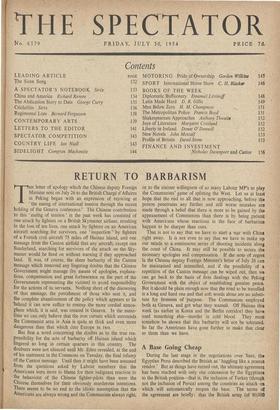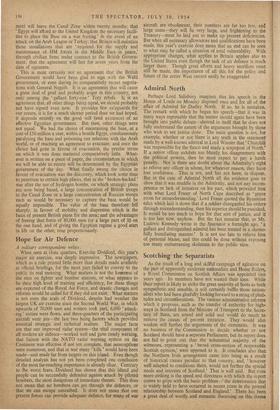A Base Going Cheap
During the last stage in the negotiations over Suez, the Egyptian Press described the British as haggling like a peanut vendor.' But as things have turned out, the ultimate agreement has been reached with only one concession by the Egyptians to the British position--that is, the inclusion of Turkey (though not the inclusion of Persia) among the countries an attack on which will automatically reopen the base. The terms of the agreement are briefly: that the British army (of 80,000 men) will leave the Canal Zone within twenty months; that ' Egypt will afford to the United Kingdom the necessary facili- ties to place the Base on a war footing' in the event of an attack on the Arab League or Turkey; that Britain will maintain those installations that are required for the supply and maintenance of HM forces in the Middle East in peace,' through civilian firms under contract to the British Govern- ment; that the agreement will last for seven years from the date of signature.
This is most certainly not an agreement that the British Government would have been glad to sign with the Wafd government, or even during its comparatively recent negotia- tions with General Neguib. It is an agreement that will cause a great deal of grief and probably anger in this country, not. only among the gallant forty-one' Tory rebels. It is an agreement that, all other things being equal, we should probably not have signed even now. It provides few safeguards for our return, it is for a much shorter period than we had hoped, it depends entirely on the good will (and existence) of an effective Egyptian government. But then, other things were not equal. We had the choice of maintaining the base, at a cost of £50 million a year, within a hostile Egypt, simultaneously paralysing the base and poisoning our relations with the Arab world, or of reaching an agreement to evacuate: and once the choice had gone in favour of evacuation, the precise terms on which it was done mattered comparatively little. What- ever is written on a piece of paper, the circumstances in which we will be able to return will be determined by the Egyptian government of • the day. What finally swung the choice in favour of evacuation was the discovery, which took some time to penetrate to certain high places, that in the broken-backed ' war after the use of hydrogen bombs, on which strategic plans are now being based, a large concentration of British troops in the Canal Zone or a large concentration of Russian troops such as would be necessary to capture the base would be equally impossible. The value of the base therefore fell sharply, in favour of mobility and dispersion which is the basis of present British plans for the area; and the advantages of freeing that force of 80,000 men (or a large part of ft) on the one hand, and of giving the Egyptian regime a good start in life on the other, rose proportionately.



































 Previous page
Previous page